Critical Analysis of Martin Luther King's 'I Have a Dream' Speech
VerifiedAdded on 2022/10/02
|6
|1338
|270
AI Summary
Undertake a critical analysis of Martin Luther King’s famous speech “I have a dream” and evaluate its historical significance.
Contribute Materials
Your contribution can guide someone’s learning journey. Share your
documents today.
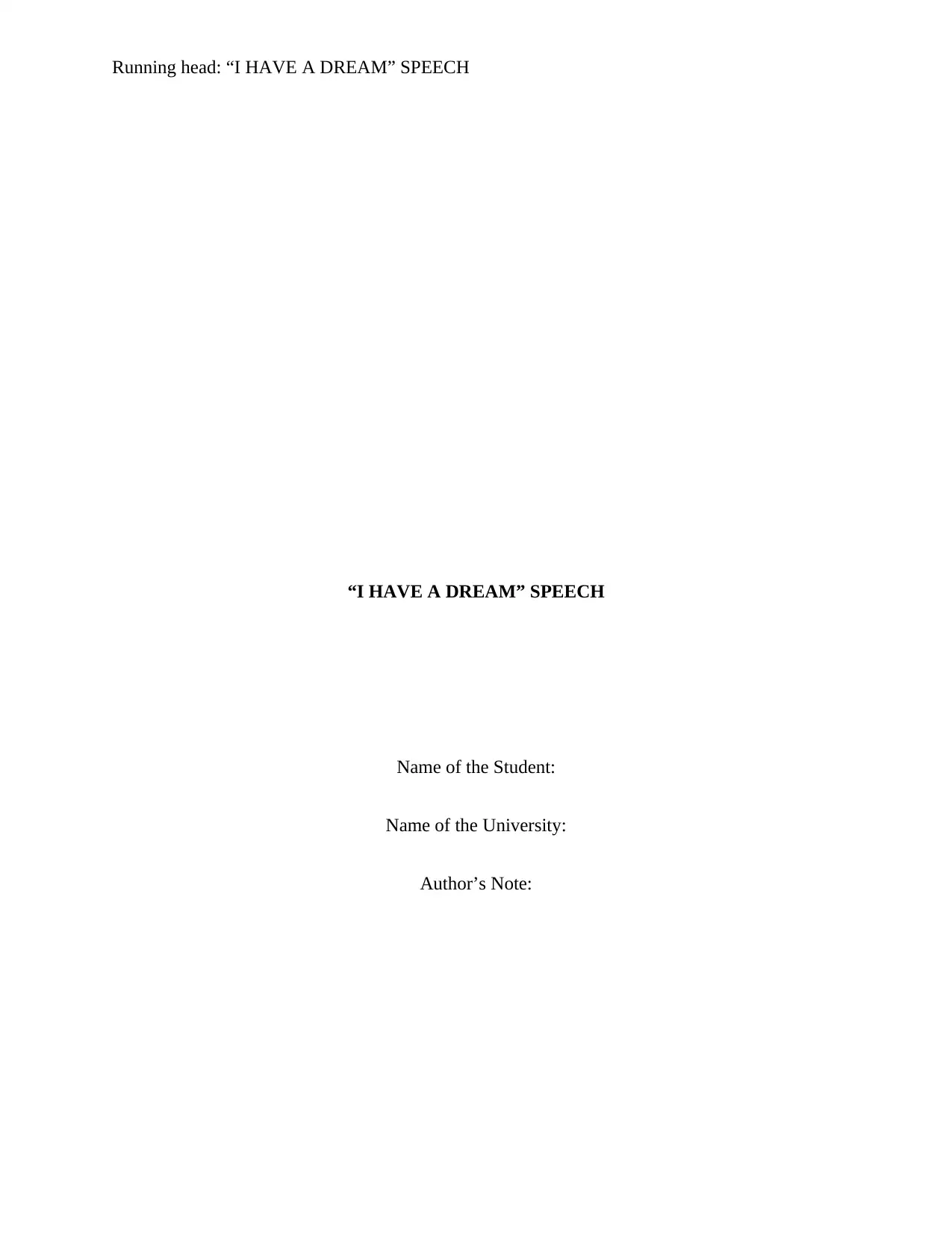
Running head: “I HAVE A DREAM” SPEECH
“I HAVE A DREAM” SPEECH
Name of the Student:
Name of the University:
Author’s Note:
“I HAVE A DREAM” SPEECH
Name of the Student:
Name of the University:
Author’s Note:
Secure Best Marks with AI Grader
Need help grading? Try our AI Grader for instant feedback on your assignments.
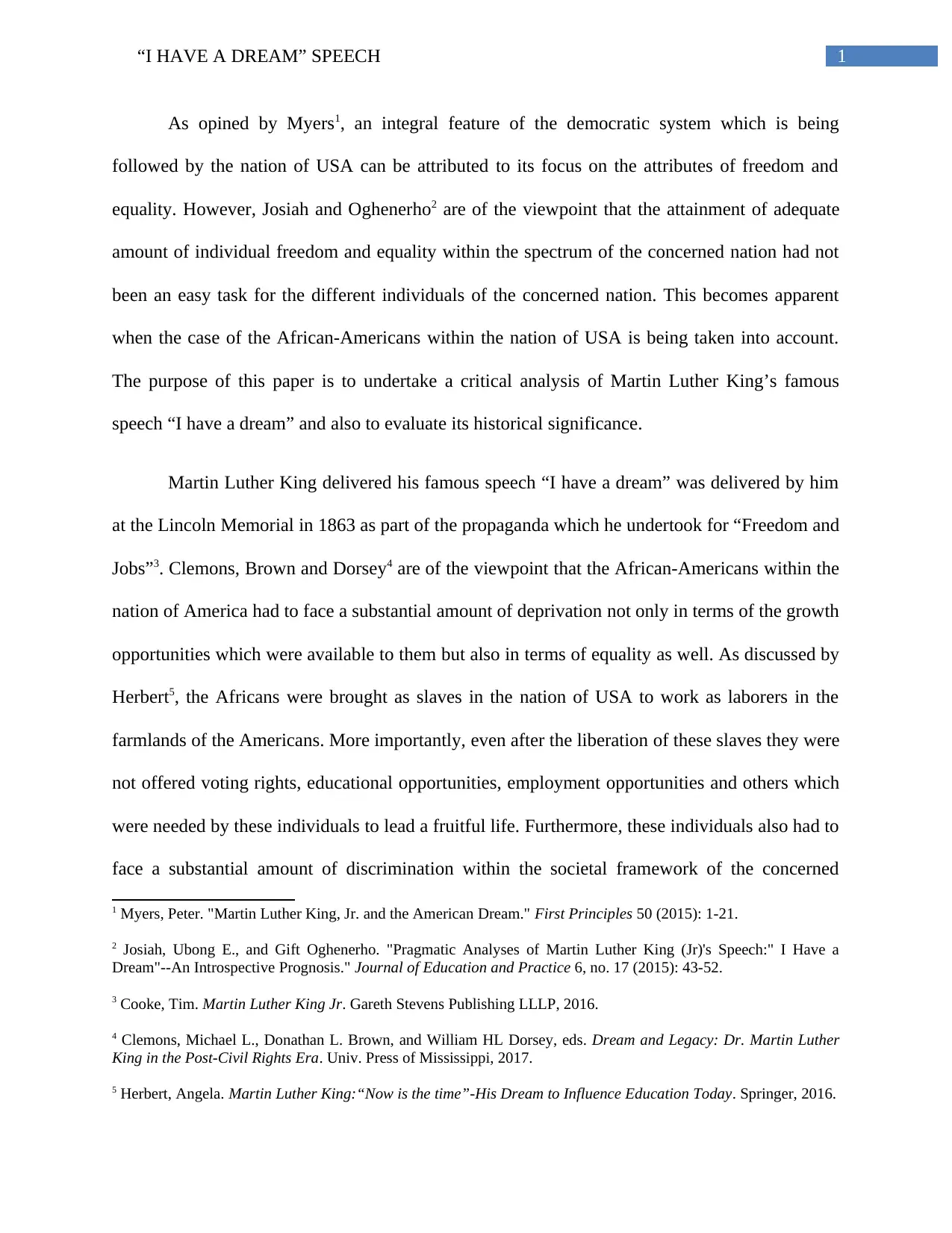
1“I HAVE A DREAM” SPEECH
As opined by Myers1, an integral feature of the democratic system which is being
followed by the nation of USA can be attributed to its focus on the attributes of freedom and
equality. However, Josiah and Oghenerho2 are of the viewpoint that the attainment of adequate
amount of individual freedom and equality within the spectrum of the concerned nation had not
been an easy task for the different individuals of the concerned nation. This becomes apparent
when the case of the African-Americans within the nation of USA is being taken into account.
The purpose of this paper is to undertake a critical analysis of Martin Luther King’s famous
speech “I have a dream” and also to evaluate its historical significance.
Martin Luther King delivered his famous speech “I have a dream” was delivered by him
at the Lincoln Memorial in 1863 as part of the propaganda which he undertook for “Freedom and
Jobs”3. Clemons, Brown and Dorsey4 are of the viewpoint that the African-Americans within the
nation of America had to face a substantial amount of deprivation not only in terms of the growth
opportunities which were available to them but also in terms of equality as well. As discussed by
Herbert5, the Africans were brought as slaves in the nation of USA to work as laborers in the
farmlands of the Americans. More importantly, even after the liberation of these slaves they were
not offered voting rights, educational opportunities, employment opportunities and others which
were needed by these individuals to lead a fruitful life. Furthermore, these individuals also had to
face a substantial amount of discrimination within the societal framework of the concerned
1 Myers, Peter. "Martin Luther King, Jr. and the American Dream." First Principles 50 (2015): 1-21.
2 Josiah, Ubong E., and Gift Oghenerho. "Pragmatic Analyses of Martin Luther King (Jr)'s Speech:" I Have a
Dream"--An Introspective Prognosis." Journal of Education and Practice 6, no. 17 (2015): 43-52.
3 Cooke, Tim. Martin Luther King Jr. Gareth Stevens Publishing LLLP, 2016.
4 Clemons, Michael L., Donathan L. Brown, and William HL Dorsey, eds. Dream and Legacy: Dr. Martin Luther
King in the Post-Civil Rights Era. Univ. Press of Mississippi, 2017.
5 Herbert, Angela. Martin Luther King:“Now is the time”-His Dream to Influence Education Today. Springer, 2016.
As opined by Myers1, an integral feature of the democratic system which is being
followed by the nation of USA can be attributed to its focus on the attributes of freedom and
equality. However, Josiah and Oghenerho2 are of the viewpoint that the attainment of adequate
amount of individual freedom and equality within the spectrum of the concerned nation had not
been an easy task for the different individuals of the concerned nation. This becomes apparent
when the case of the African-Americans within the nation of USA is being taken into account.
The purpose of this paper is to undertake a critical analysis of Martin Luther King’s famous
speech “I have a dream” and also to evaluate its historical significance.
Martin Luther King delivered his famous speech “I have a dream” was delivered by him
at the Lincoln Memorial in 1863 as part of the propaganda which he undertook for “Freedom and
Jobs”3. Clemons, Brown and Dorsey4 are of the viewpoint that the African-Americans within the
nation of America had to face a substantial amount of deprivation not only in terms of the growth
opportunities which were available to them but also in terms of equality as well. As discussed by
Herbert5, the Africans were brought as slaves in the nation of USA to work as laborers in the
farmlands of the Americans. More importantly, even after the liberation of these slaves they were
not offered voting rights, educational opportunities, employment opportunities and others which
were needed by these individuals to lead a fruitful life. Furthermore, these individuals also had to
face a substantial amount of discrimination within the societal framework of the concerned
1 Myers, Peter. "Martin Luther King, Jr. and the American Dream." First Principles 50 (2015): 1-21.
2 Josiah, Ubong E., and Gift Oghenerho. "Pragmatic Analyses of Martin Luther King (Jr)'s Speech:" I Have a
Dream"--An Introspective Prognosis." Journal of Education and Practice 6, no. 17 (2015): 43-52.
3 Cooke, Tim. Martin Luther King Jr. Gareth Stevens Publishing LLLP, 2016.
4 Clemons, Michael L., Donathan L. Brown, and William HL Dorsey, eds. Dream and Legacy: Dr. Martin Luther
King in the Post-Civil Rights Era. Univ. Press of Mississippi, 2017.
5 Herbert, Angela. Martin Luther King:“Now is the time”-His Dream to Influence Education Today. Springer, 2016.
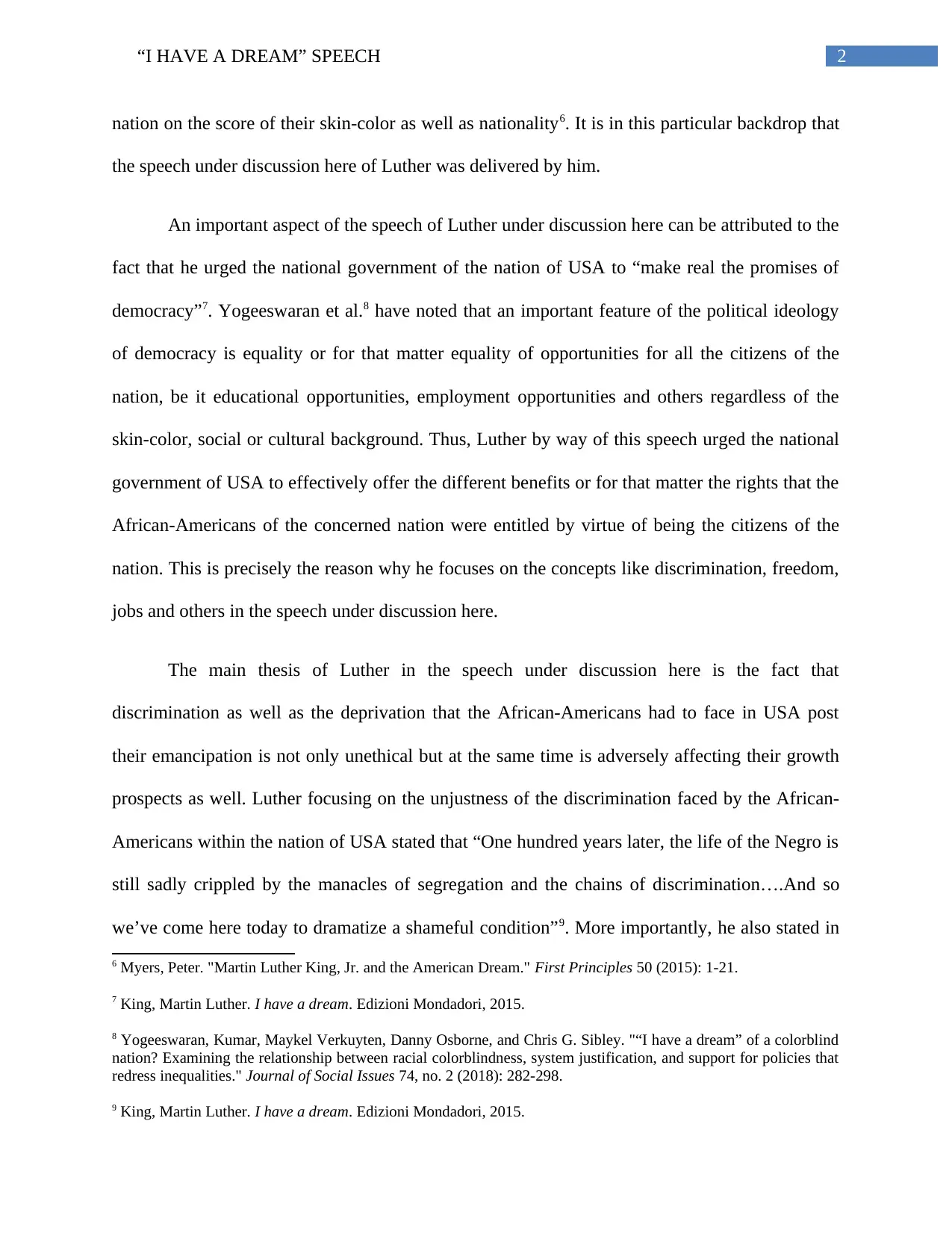
2“I HAVE A DREAM” SPEECH
nation on the score of their skin-color as well as nationality6. It is in this particular backdrop that
the speech under discussion here of Luther was delivered by him.
An important aspect of the speech of Luther under discussion here can be attributed to the
fact that he urged the national government of the nation of USA to “make real the promises of
democracy”7. Yogeeswaran et al.8 have noted that an important feature of the political ideology
of democracy is equality or for that matter equality of opportunities for all the citizens of the
nation, be it educational opportunities, employment opportunities and others regardless of the
skin-color, social or cultural background. Thus, Luther by way of this speech urged the national
government of USA to effectively offer the different benefits or for that matter the rights that the
African-Americans of the concerned nation were entitled by virtue of being the citizens of the
nation. This is precisely the reason why he focuses on the concepts like discrimination, freedom,
jobs and others in the speech under discussion here.
The main thesis of Luther in the speech under discussion here is the fact that
discrimination as well as the deprivation that the African-Americans had to face in USA post
their emancipation is not only unethical but at the same time is adversely affecting their growth
prospects as well. Luther focusing on the unjustness of the discrimination faced by the African-
Americans within the nation of USA stated that “One hundred years later, the life of the Negro is
still sadly crippled by the manacles of segregation and the chains of discrimination….And so
we’ve come here today to dramatize a shameful condition”9. More importantly, he also stated in
6 Myers, Peter. "Martin Luther King, Jr. and the American Dream." First Principles 50 (2015): 1-21.
7 King, Martin Luther. I have a dream. Edizioni Mondadori, 2015.
8 Yogeeswaran, Kumar, Maykel Verkuyten, Danny Osborne, and Chris G. Sibley. "“I have a dream” of a colorblind
nation? Examining the relationship between racial colorblindness, system justification, and support for policies that
redress inequalities." Journal of Social Issues 74, no. 2 (2018): 282-298.
9 King, Martin Luther. I have a dream. Edizioni Mondadori, 2015.
nation on the score of their skin-color as well as nationality6. It is in this particular backdrop that
the speech under discussion here of Luther was delivered by him.
An important aspect of the speech of Luther under discussion here can be attributed to the
fact that he urged the national government of the nation of USA to “make real the promises of
democracy”7. Yogeeswaran et al.8 have noted that an important feature of the political ideology
of democracy is equality or for that matter equality of opportunities for all the citizens of the
nation, be it educational opportunities, employment opportunities and others regardless of the
skin-color, social or cultural background. Thus, Luther by way of this speech urged the national
government of USA to effectively offer the different benefits or for that matter the rights that the
African-Americans of the concerned nation were entitled by virtue of being the citizens of the
nation. This is precisely the reason why he focuses on the concepts like discrimination, freedom,
jobs and others in the speech under discussion here.
The main thesis of Luther in the speech under discussion here is the fact that
discrimination as well as the deprivation that the African-Americans had to face in USA post
their emancipation is not only unethical but at the same time is adversely affecting their growth
prospects as well. Luther focusing on the unjustness of the discrimination faced by the African-
Americans within the nation of USA stated that “One hundred years later, the life of the Negro is
still sadly crippled by the manacles of segregation and the chains of discrimination….And so
we’ve come here today to dramatize a shameful condition”9. More importantly, he also stated in
6 Myers, Peter. "Martin Luther King, Jr. and the American Dream." First Principles 50 (2015): 1-21.
7 King, Martin Luther. I have a dream. Edizioni Mondadori, 2015.
8 Yogeeswaran, Kumar, Maykel Verkuyten, Danny Osborne, and Chris G. Sibley. "“I have a dream” of a colorblind
nation? Examining the relationship between racial colorblindness, system justification, and support for policies that
redress inequalities." Journal of Social Issues 74, no. 2 (2018): 282-298.
9 King, Martin Luther. I have a dream. Edizioni Mondadori, 2015.
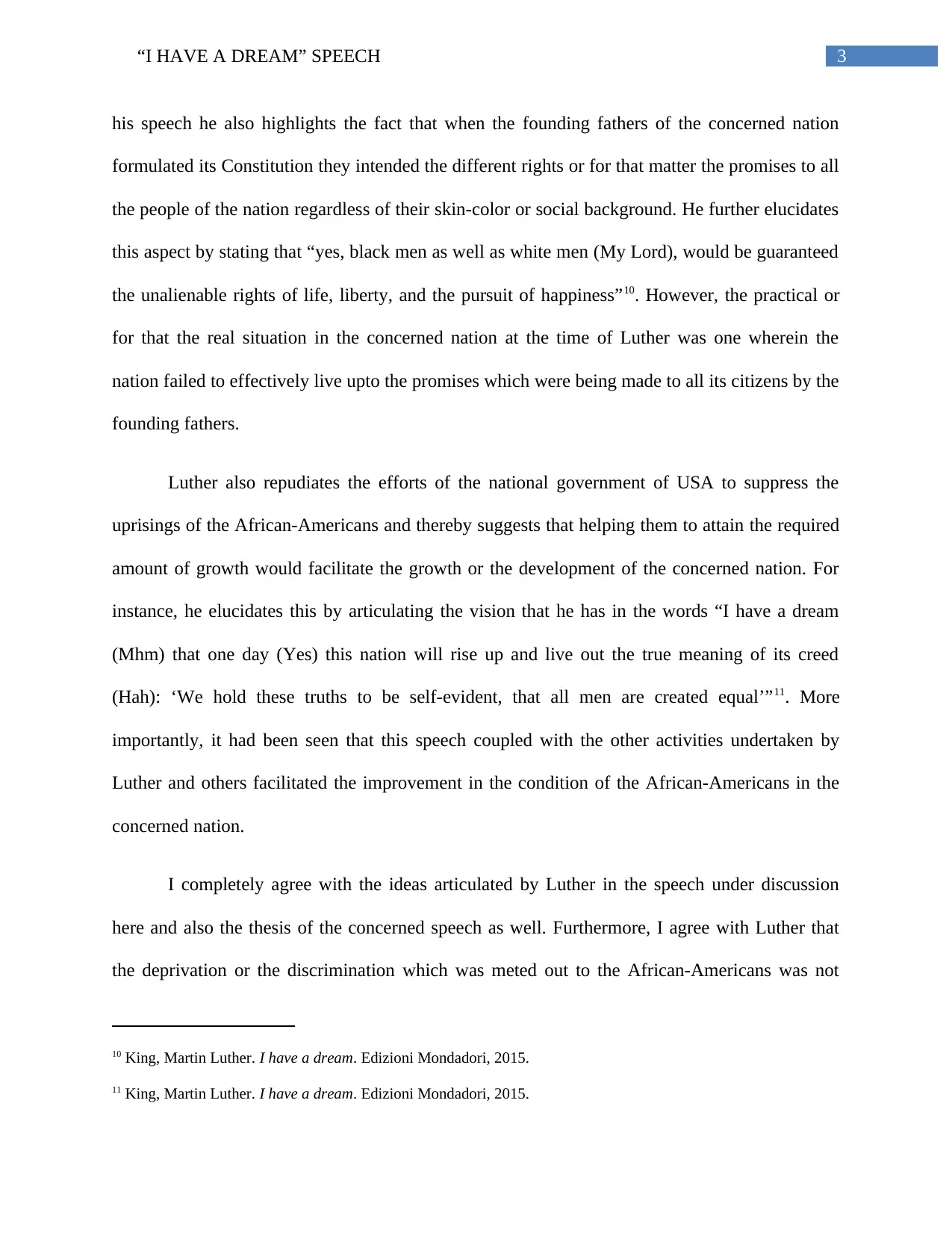
3“I HAVE A DREAM” SPEECH
his speech he also highlights the fact that when the founding fathers of the concerned nation
formulated its Constitution they intended the different rights or for that matter the promises to all
the people of the nation regardless of their skin-color or social background. He further elucidates
this aspect by stating that “yes, black men as well as white men (My Lord), would be guaranteed
the unalienable rights of life, liberty, and the pursuit of happiness”10. However, the practical or
for that the real situation in the concerned nation at the time of Luther was one wherein the
nation failed to effectively live upto the promises which were being made to all its citizens by the
founding fathers.
Luther also repudiates the efforts of the national government of USA to suppress the
uprisings of the African-Americans and thereby suggests that helping them to attain the required
amount of growth would facilitate the growth or the development of the concerned nation. For
instance, he elucidates this by articulating the vision that he has in the words “I have a dream
(Mhm) that one day (Yes) this nation will rise up and live out the true meaning of its creed
(Hah): ‘We hold these truths to be self-evident, that all men are created equal’”11. More
importantly, it had been seen that this speech coupled with the other activities undertaken by
Luther and others facilitated the improvement in the condition of the African-Americans in the
concerned nation.
I completely agree with the ideas articulated by Luther in the speech under discussion
here and also the thesis of the concerned speech as well. Furthermore, I agree with Luther that
the deprivation or the discrimination which was meted out to the African-Americans was not
10 King, Martin Luther. I have a dream. Edizioni Mondadori, 2015.
11 King, Martin Luther. I have a dream. Edizioni Mondadori, 2015.
his speech he also highlights the fact that when the founding fathers of the concerned nation
formulated its Constitution they intended the different rights or for that matter the promises to all
the people of the nation regardless of their skin-color or social background. He further elucidates
this aspect by stating that “yes, black men as well as white men (My Lord), would be guaranteed
the unalienable rights of life, liberty, and the pursuit of happiness”10. However, the practical or
for that the real situation in the concerned nation at the time of Luther was one wherein the
nation failed to effectively live upto the promises which were being made to all its citizens by the
founding fathers.
Luther also repudiates the efforts of the national government of USA to suppress the
uprisings of the African-Americans and thereby suggests that helping them to attain the required
amount of growth would facilitate the growth or the development of the concerned nation. For
instance, he elucidates this by articulating the vision that he has in the words “I have a dream
(Mhm) that one day (Yes) this nation will rise up and live out the true meaning of its creed
(Hah): ‘We hold these truths to be self-evident, that all men are created equal’”11. More
importantly, it had been seen that this speech coupled with the other activities undertaken by
Luther and others facilitated the improvement in the condition of the African-Americans in the
concerned nation.
I completely agree with the ideas articulated by Luther in the speech under discussion
here and also the thesis of the concerned speech as well. Furthermore, I agree with Luther that
the deprivation or the discrimination which was meted out to the African-Americans was not
10 King, Martin Luther. I have a dream. Edizioni Mondadori, 2015.
11 King, Martin Luther. I have a dream. Edizioni Mondadori, 2015.
Secure Best Marks with AI Grader
Need help grading? Try our AI Grader for instant feedback on your assignments.
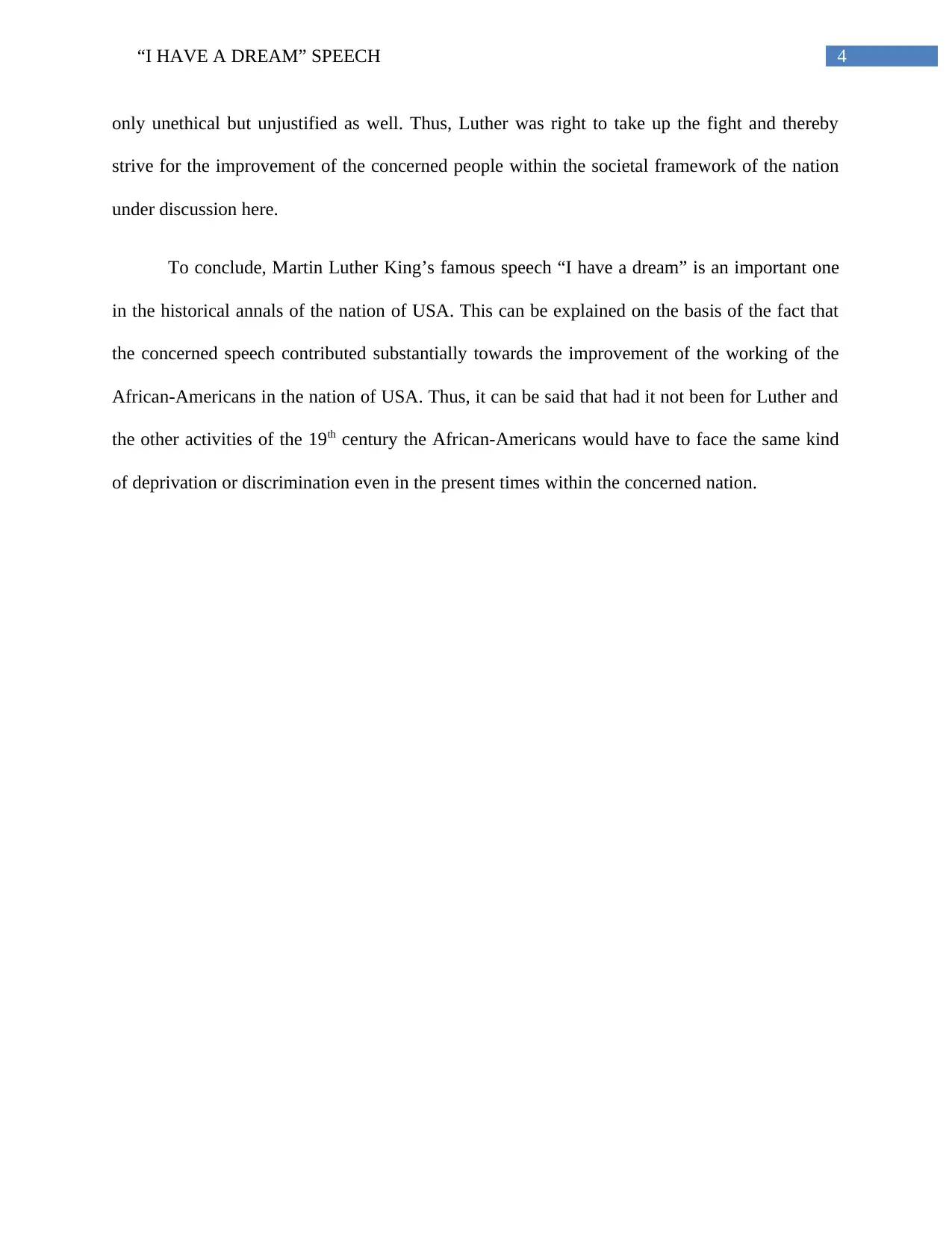
4“I HAVE A DREAM” SPEECH
only unethical but unjustified as well. Thus, Luther was right to take up the fight and thereby
strive for the improvement of the concerned people within the societal framework of the nation
under discussion here.
To conclude, Martin Luther King’s famous speech “I have a dream” is an important one
in the historical annals of the nation of USA. This can be explained on the basis of the fact that
the concerned speech contributed substantially towards the improvement of the working of the
African-Americans in the nation of USA. Thus, it can be said that had it not been for Luther and
the other activities of the 19th century the African-Americans would have to face the same kind
of deprivation or discrimination even in the present times within the concerned nation.
only unethical but unjustified as well. Thus, Luther was right to take up the fight and thereby
strive for the improvement of the concerned people within the societal framework of the nation
under discussion here.
To conclude, Martin Luther King’s famous speech “I have a dream” is an important one
in the historical annals of the nation of USA. This can be explained on the basis of the fact that
the concerned speech contributed substantially towards the improvement of the working of the
African-Americans in the nation of USA. Thus, it can be said that had it not been for Luther and
the other activities of the 19th century the African-Americans would have to face the same kind
of deprivation or discrimination even in the present times within the concerned nation.
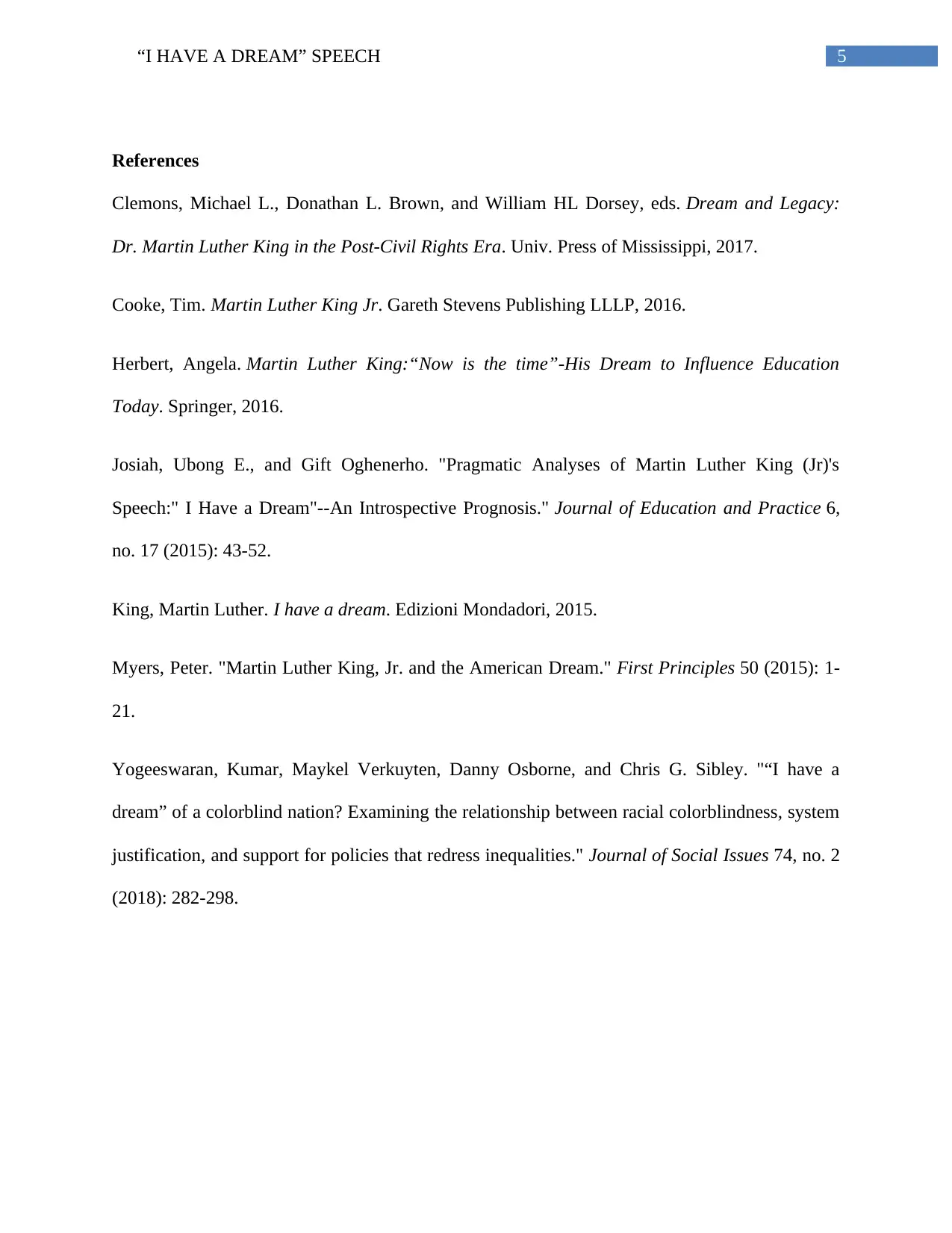
5“I HAVE A DREAM” SPEECH
References
Clemons, Michael L., Donathan L. Brown, and William HL Dorsey, eds. Dream and Legacy:
Dr. Martin Luther King in the Post-Civil Rights Era. Univ. Press of Mississippi, 2017.
Cooke, Tim. Martin Luther King Jr. Gareth Stevens Publishing LLLP, 2016.
Herbert, Angela. Martin Luther King:“Now is the time”-His Dream to Influence Education
Today. Springer, 2016.
Josiah, Ubong E., and Gift Oghenerho. "Pragmatic Analyses of Martin Luther King (Jr)'s
Speech:" I Have a Dream"--An Introspective Prognosis." Journal of Education and Practice 6,
no. 17 (2015): 43-52.
King, Martin Luther. I have a dream. Edizioni Mondadori, 2015.
Myers, Peter. "Martin Luther King, Jr. and the American Dream." First Principles 50 (2015): 1-
21.
Yogeeswaran, Kumar, Maykel Verkuyten, Danny Osborne, and Chris G. Sibley. "“I have a
dream” of a colorblind nation? Examining the relationship between racial colorblindness, system
justification, and support for policies that redress inequalities." Journal of Social Issues 74, no. 2
(2018): 282-298.
References
Clemons, Michael L., Donathan L. Brown, and William HL Dorsey, eds. Dream and Legacy:
Dr. Martin Luther King in the Post-Civil Rights Era. Univ. Press of Mississippi, 2017.
Cooke, Tim. Martin Luther King Jr. Gareth Stevens Publishing LLLP, 2016.
Herbert, Angela. Martin Luther King:“Now is the time”-His Dream to Influence Education
Today. Springer, 2016.
Josiah, Ubong E., and Gift Oghenerho. "Pragmatic Analyses of Martin Luther King (Jr)'s
Speech:" I Have a Dream"--An Introspective Prognosis." Journal of Education and Practice 6,
no. 17 (2015): 43-52.
King, Martin Luther. I have a dream. Edizioni Mondadori, 2015.
Myers, Peter. "Martin Luther King, Jr. and the American Dream." First Principles 50 (2015): 1-
21.
Yogeeswaran, Kumar, Maykel Verkuyten, Danny Osborne, and Chris G. Sibley. "“I have a
dream” of a colorblind nation? Examining the relationship between racial colorblindness, system
justification, and support for policies that redress inequalities." Journal of Social Issues 74, no. 2
(2018): 282-298.
1 out of 6
Your All-in-One AI-Powered Toolkit for Academic Success.
+13062052269
info@desklib.com
Available 24*7 on WhatsApp / Email
![[object Object]](/_next/static/media/star-bottom.7253800d.svg)
Unlock your academic potential
© 2024 | Zucol Services PVT LTD | All rights reserved.





